
Look at the birds of the air; they do not sow or reap or store away in barns, and yet your heavenly Father feeds them. Are you not much more valuable than they? -Jesus (Matt 6:26, NIV)
I was surprised to find, while reading Matthew 6:26 in its original Greek, that the word translated as “more valuable” (NIV)—or “of more value” (NRSV), or “more important” (NASB)—is one that I was taught simply meant “differ.” We might read Jesus’ question as: Are you not, rather, different from them?
I thought this was interesting. But I also remembered that there’s also another passage where Jesus says we’re more valuable than many sparrows. I thought, maybe the Greek is more clear in that passage—which might suggest that this one should be translated as it usually is.
So I looked the other passage up. It’s Matthew 10:31: So don’t be afraid; you are worth more than many sparrows (NIV). It turns out, though, that here too the word translated as “worth more” is the same word used in Matt 6:26—the one that could be translated not as “worth more” or “more valuable” but just as “different.”
Same thing with the similar stuff Jesus says in Matt 12:12 (How much more valuable is a person than a sheep?), Luke 12:7 (Don’t be afraid; you are worth more than many sparrows), and Luke 12:24 (And how much more valuable are you than birds?). It’s all the same Greek word.
I’m not saying there aren’t potentially some good reasons to translate this word as “more valuable.” But does seem interesting that it could be just “different.”
I think about the idea that humans are “more valuable” than birds or sheep or other creatures, and I wonder if it plays into the global climate crisis we’re in—that is, into the damaging mindset that has gotten us here. I wonder if it isn’t terribly helpful to keep thinking of the world as a hierarchy of species, where humans are more valuable than other creatures—to keep thinking of humans as if we are separate from the rest of the created world, as if we are better, as if we are free to do whatever we want without considering its impact on other species and on the land.
Yes, humans are valuable. And so are birds. And so are wildflowers, and so is every other aspect of the natural world that surrounds us. And the reality is that we are all dependent on one another. We all flourish together, or none of us flourishes.
Humans are different from birds; we are different from every other species, just as each of these species is different from one another. But we aren’t part of a special privileged class of species that isn’t affected by the earth’s sickness. We are affected—especially the materially poor among us, and especially communities of color.
I think about the biblical creation story. I used to think God only declared creation “very good” after God made humans (Gen 1:31), which meant that humans were especially awesome. Now I see that when God declared creation “very good,” God wasn’t just talking about humans. God was speaking of the whole world and all its beings as a collective whole—not just humans, but also plants, animals, sun, moon, stars, water, land. A unified, interconnected, interdependent whole. This is what was—and is—“very good” indeed.
God is the creator and the good caretaker of the birds, and the waters, and the plants, and the humans—of all God has made. All of these creations are gloriously unique, each different from the other. Does one have to be called “more valuable” than another?
Each species has different needs, different gifts, different challenges, different kinds of goodness and beauty to offer. God sees and honors all of it. God feeds the birds and God feeds the humans, in the different ways we need to be fed, the different things we hunger for.
Certainly humans have different needs from those of the birds. But is one better, or worse? Worth more, or less? It seems like a bit of a human impulse to label things in this way—and perhaps especially the impulse of a certain kind of human who has lost a sense of connection with the natural world.
But we are not disconnected from the natural world. Living as if we were has brought us to the precipice of a terrifying new era of natural disaster. There may still be ways to walk back from this precipice—but we’ll need to make some deep changes to our ways of thinking, our ways of being, our ways of relating.
Maybe we can start with rethinking the hierarchies we’ve created among species. We can learn to see humans as an interdependent part of the natural world, not separate from or better than the rest of it. We can learn to see ourselves as different from birds, but not necessarily more valuable.
And maybe, in so doing, we can learn to see the God who loves and longs to take care of us all—of the whole “very good” creation God has made.